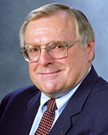Fourth KU Engineering Professor Elected to National Academy

University of Kansas distinguished professor Paul Willhite has become the fourth KU professor elected to the prestigious National Academy of Engineering, the highest professional distinction accorded to an engineer. KU is the only university in the state with faculty members in the academy.
"All of us in the KU School of Engineering are proud that Paul has been recognized for his exceptional talents and career," said Stuart Bell, dean of the School of Engineering. "We've long known of his skills and abilities. Now, through this deserved mark of distinction, others throughout the world will recognize his gifts." Willhite joins Stan Rolfe, Albert P. Learned Distinguished Professor of Civil, Environmental and Architectural Engineering, and professors emeriti Dick Moore and Ross McKinney as KU faculty members elected to the academy. Academy membership honors those who have made outstanding contributions to engineering research, practice or education, and membership stands as a benchmark of quality for academic institutions.
The academy has more than 2,000 peer-elected members who are among the world's most accomplished engineers. They provide the leadership and expertise for numerous projects focused on the relationships between engineering, technology and the quality of life.
"Election to the National Academy of Engineering is a supreme professional honor for Paul," said Jim Roberts, vice provost for research, "reflecting his devotion to students, his commitment to research and his desire to serve the needs of society. That's a great combination in any KU faculty member." KU Chancellor Robert Hemenway concurred that the honor extends beyond personal recognition of Willhite.
"Prestigious memberships are a national mark of distinction for KU and the School of Engineering," Hemenway said. "The whole university is honored when one of our own earns this kind of major recognition."
Willhite, who has been with KU since 1969, is the Ross E. Forney Distinguished Professor of Chemical and Petroleum Engineering and co-director of the Tertiary Oil Recovery Project and the KU Energy Research Center. His contributions to the field of petroleum engineering earned him the Improved Oil Recovery Pioneer Award at the 14th Society of Petroleum Engineers/Department of Energy Symposium on Improved Oil Recovery in 2004. He is the recipient of the John Franklin Carll Award, the Lester C. Uren Award and the Distinguished Achievement Award for Petroleum Engineering Faculty, both from the Society of Petroleum Engineers. He received the Professional Achievement Citation in Engineering from Iowa State University in 1995. In 1999, Willhite received KU's Excellence in Teaching Award from the Center for Teaching Excellence. Willhite has authored numerous journal articles, publications and technical reports. He is the author of a textbook Waterflooding a technique for recovering more oil from aging reservoirs and co-author of the textbook Enhanced Oil Recovery. He is a review chair for the Society of Petroleum Engineer's Journal. He holds five U.S. patents. He has served in a variety of leadership roles at the department, school and university level during his tenure at KU. He is a distinguished member of the SPE and a member of the American Institute of Chemical Engineers, Tau Beta Pi and the American Society for Engineering Education. The National Academies, the National Academy of Engineering, the National Academy of Sciences, the Institute of Medicine and the National Research Council perform an unparalleled public service by bringing together committees of experts in all areas of scientific and technological endeavor. These experts serve pro bono to address critical national issues and give advice to the federal government and the public.
The National Academy of Engineering, which was formed 1964 through an expansion of the National Academy of Sciences, provides engineering leadership in service to the nation. The academy operates under the same congressional act of incorporation that established the National Academy of Sciences, signed in 1863 by President Lincoln. Under this charter the academy is directed "whenever called upon by any department or agency of the government, to investigate, examine, experiment, and report upon any subject of science or art."